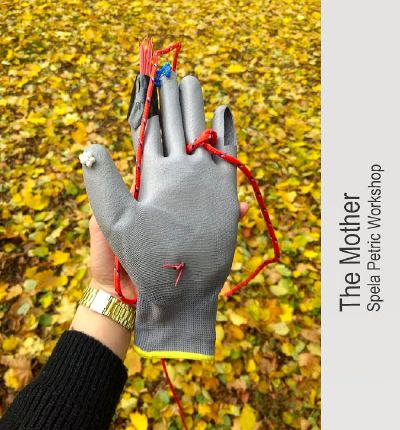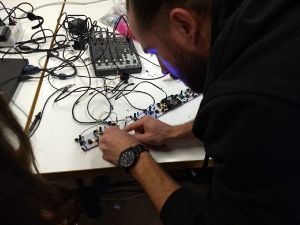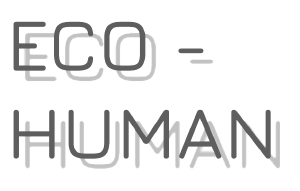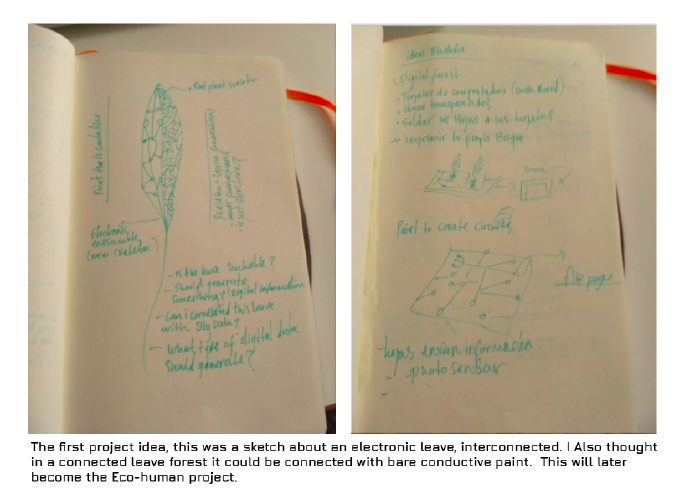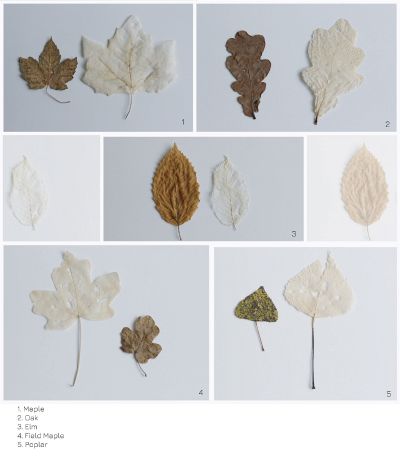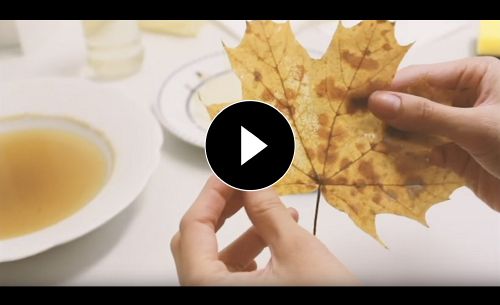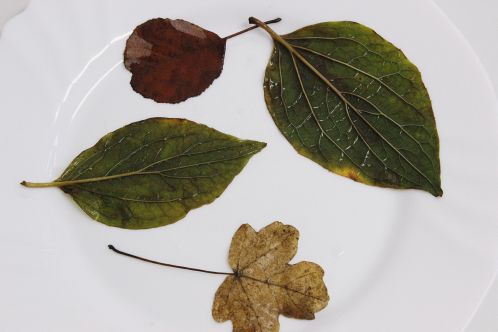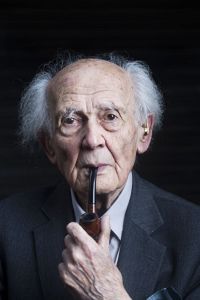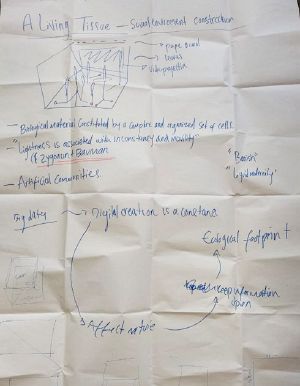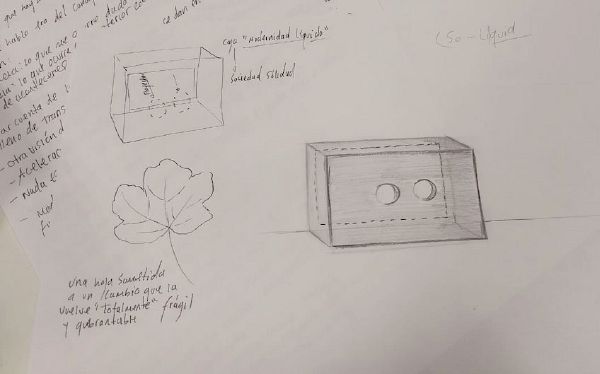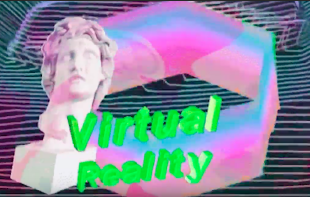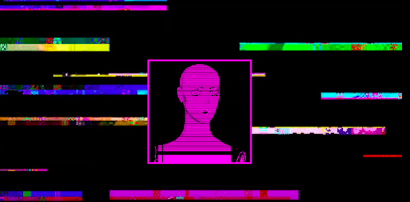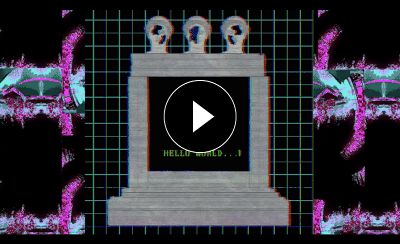| (93 intermediate revisions by the same user not shown) | |||
| Line 33: | Line 33: | ||
= '''Trasnmediale Forum''' = | = '''Trasnmediale Forum''' = | ||
---- | |||
The student forum in the Transmediale was certainly interesting. It was my first participation in this Festival. The preparation as a group of students was dispersed, in my opinion, there was not good preparation for the festival even with anticipated time. Perhaps it was not clear how and what we would do to participate in the festival since our projects and perspectives were totally different and we could not talk together about a single topic, but about what each one was working as a class project. | |||
The group activity of Bio-yoga was fun and almost the last resort in mind to introduce us at the Transmediale. It was not our best group product but we tried to experiment with some "method" that will integrate our projects regarding Biomedia Art. Talking about my project in public was a bit overwhelming, moreover because by that time I still had concerns defining the concept, what my project represented and his relationship with Bio-media Art. However, it was a situation that pushed me to specific ideas for the realization of my Eco-human project, which was really beneficial and productive. I think that for an upcoming experience and presentation as a student, I would make more elaborate participation with my classmates. | |||
= '''Project Eco-Human''' = | = '''Project Eco-Human''' = | ||
| Line 40: | Line 45: | ||
''by Laura Giraldo, Bauhaus University 2019'' | ''by Laura Giraldo, Bauhaus University 2019'' | ||
---- | ---- | ||
[[File:Eco_human_title.jpg|300px]] | |||
Eco etymology: Latin "echo", from the Greek "ἠχώ" and means "sound". Greek mythology tells us about the nymph Echo, whose voice repeated others in the forest, after his death. It is also called echo to the footprint, at the conceptual level, which leaves something behind. | Eco etymology: Latin "echo", from the Greek "ἠχώ" and means "sound". Greek mythology tells us about the nymph Echo, whose voice repeated others in the forest, after his death. It is also called echo to the footprint, at the conceptual level, which leaves something behind. | ||
'''Concept''' | |||
It is impossible not to interact with our environment in a parasitic, symbiotic or beneficial way, however, what is important is how we relate to this according to our needs, so we can not ignore the current construction of the digital, virtual and technological eco-system of the century XXI. This "eco-system" is vertiginous, light and inconsistent, so the concept of time is not the same and makes change the norm. The uncertainty produced by the now vivid "Liquid Modernity" widely described by Zygmunt Bauman in the book bearing the same name, has caused the almost unlimited acceleration of individualism, the siege, the transience, the finitude and the fragility of "almost everything". | |||
This modernity receives the constant creation of digital content inspired by "reality" where the actor subject of the "eco-system" seeks to build itself with a flexible identity that allows it to adapt to different scenarios and people, but that is no longer related to the construction of an "I", but that is in function of the others. This generates a strong dependence on acceptance. The subject takes a selfie, edit it according to the construction of the Self = others (Perhaps whiter teeth, attenuate skin color, remove "imperfections, more bust, etc.) uploads the photo which is already a liquid element, superfluous and transient, awaits acceptance through a like, this is how the person has been subjected to a "temporary" assisted evolution through technology. | |||
In this project, I look for the artistic approach to this “concept” using a wooden box, modified natural leaves, and an experimental video as elements of representation. The leaf and the process for its fragility turn out to be a finite process, it externalizes the connection of which the leaf was part, part of something bigger, a tree. Now the leaf is individualized, it is separated from what the leaf “is” and it is transformed into a skeleton that remembers what the leaf was. The almost translucent skeleton reveals the connections and the natural microcosm that has lost the ability to regulate itself after separating, as it renounces its own homeostasis. The finitude of human corporeality is represented by the wooden box, inside this box is projected a video of echoes generated by individuals who have built a digital "me" to the complacency of the "other". | |||
* '''''How did this project start?''''' | |||
Sizing the project for the Art and Biomedia class was a big challenge because this was my first approach in the field. I decided to join two themes that are of my interest, the collection of flowers and leaves to make herbal (herbarium) and the sociological theories that explain the social behavior and new forms of interaction in our modernity (21st century). I had been fascinated with the skeletal leaves that I had once found while collecting materials for my herbal books, but it was not until I started the Biomedia Art class that I was interested in knowing how these kinds of leaves were generated. At that moment I had several questions to answer: How can I make transparent leaves without waiting for nature, humidity and some microorganisms to do so? What sociological aspect I want to talk about and how am I going to represent it? How will I join these two fields in a Biomedia-Art project? | |||
[[File:sketch_1.jpg|700px]] | |||
* '''''Technical development''''' | |||
- ''Leaves process'' | |||
I looked over some processes that I could be used to make transparent or skeletal the sheets, I had an experimentation stage with this process. I started by leaving the leaves in a container with water for a week, during this time the chlorophyll of the leaves was fading, so the water became dirty and had to be changed every week. After the first month, I noticed that only the leaves type: Maple, Oak, Elm, Field maple, Poplar and Field Maple lasted and did not break or disintegrate easily. These were the leaves that I worked with. The first set of leaves were submerged in water for 2 and a half months. The change was very slow, I could observe the small pieces of the coating or waxy cuticle of the leaves. The second set of leaves was in water with sodium carbonate. I put the baking soda in the oven for 30 minutes at 250 degrees. This generates a chemical reaction that changes its formula from Na2CO3 to NaHCO3, it helps to clean and discolor the leaves. With this process, the sheets were easier to brush. The general process with every leave was pealing the skin softly with different types of brushes. | |||
[[File:Leaves_types.jpg|400px]] | |||
Video process: ''"How I made leaves transparent"'' | |||
[[File:Video_pre_1.jpg|500px|link=https://youtu.be/5Gh_zFFY7bg]] | |||
[[File:H_1.jpg|498px|link=https://www.uni-weimar.de/kunst-und-gestaltung/wiki/Leaves_Process_gallery]] | |||
[[ | ''Please visit'' [[Leaves Process gallery]] | ||
---- | |||
- ''Concept development'' | |||
My interest in sociology has led me to read books like liquid modernity, this being one of the books with one of the most relevant and accurate theories about the social behavior of the 21st century. My desire was to express part of the message of this book through an artistic experience, so I chose my Biomedia project as a channel. | |||
Liquid modernity is a form of social organization whose fundamental characteristic is transience, which is part of it always flows and is finite. Starting from this theory generate the concept of Eco-Humam, a wooden box that would account for the vertiginous transformations of our current society in the world of virtuality. | |||
Our social interaction in the virtual world presents us with another vision of temporality in which it does not stop creating content that besets us and generates a dystopia between the "legacy" and the permanence (Echo) through the constant content and reality of a superfluous image that disappears. | |||
[[File:Z-Bauman.jpg|200px]] | |||
Liquid modernity by Zygmunt Bauman | |||
Book abstract: | |||
Starting from the postmodern, the philosophical and sociological speculation by Zygmunt Bauman, opens - through the analysis of the phenomenon of globalization - to the meta-level of life, and then circumscribes the most recent thinking on political life, until reaching the liquid modernity: overcoming postmodernity itself. As a result individual, society, ethics, power, religion become those words impregnated with a liquidity capable of condensing in itself the most significant aspects of the present reality: a dimension in which the lasting gives way to the transient, the need to the desire, and the necessity to the utility. | |||
Video process | PDF BOOK LIQUID MODERNITY: https://giuseppecapograssi.files.wordpress.com/2014/01/bauman-liquid-modernity.pdf | ||
-'''Bibliography''' | |||
- Bauman Zygmunt: Liquid Modernity. 2000, Polity Press, United Kingdom. | |||
- Dunne, Anthony; Raby, Fiona: Speculative Everything: Design, Fiction, and Social Dreaming. 2013, | |||
- Meyers, Williams: Bio art. 2015, London. | |||
[[File:Sketch_2_Eco_Human.jpg|300px]] [[File:sketch_3_Eco_Human.jpg|600px]] | |||
---- | |||
- ''Video Art process'' | |||
[[File:VReality.jpg|310px]] [[File:VReality_2.jpg|410px]] | |||
The aesthetic concept that will decide to use for the design of the aesthetics of Brutalism or also called new ugly. | |||
What is a new brutal-brutalist design? | |||
The origin of brutalist design has its roots in brutalist architecture, an architectural movement that emerged from the current of modernism in the 50s and 70s. The new image is a graphic design trend called Nueva Ugly, which appeared in Europe in 2007 | |||
It is the denial of the canon taken to the extreme. Try to challenge the supposedly correct way of working by mocking the well done. He is not quite sure what the exact origins of New Ugly are. The most accepted theory among the studies of the subject is defined as a response against monotony and against a boring and disenchanted lifestyle due to its lack of prospects for a better future than the past. Therefore, it is not so important because you can practice experimentation without limits. | |||
The video was edited with 2 programs: Adobe premiere and adobe after effects. The material I used for the video was already existing but I modified it to create gifs and images to create the video. | |||
New Ugly Inspiration Art: | |||
https://www.pinterest.es/roquestrew/the-new-ugly/?lp=true | |||
Some Articles about New Ugly and Brutalist design: | |||
https://www.awwwards.com/brutalism-brutalist-websites.html | |||
https://www.imaginarycloud.com/blog/why-we-need-web-brutalism/ | |||
https://medium.com/envato/brutalism-the-ugly-web-design-trend-taking-over-the-internet-2dbc8e822e37 | |||
Video Inside the box: | Video Inside the box: | ||
[[File:Video_pre_2.jpg| | [[File:Video_pre_2.jpg|400px|link=https://youtu.be/75oJfNo1DaM]] | ||
---- | |||
- ''Box Process- Ensembling and final result'' | |||
I used MDF wood of 5mm to make the Eco-human box. The size of the box was almost the same size as the screen that was placed in the bottom. I decided to use a laser cut machine for making more prolix de shape of the box. I assembled the wood pieces with hard glue and also hold it with screws to make it more solid and secure for the screen. The inside of the box was painted in black as the rectangular pieces of polystyrene that helped as a base for holding the leaves. I glued the leaves in the polystyrene pieces with hard silicone, these pieces were placed inside the box with a strong adhesive tape. | |||
<gallery> | |||
File:B_1.JPG | |||
File:B_2.JPG | |||
File:B_3.jpg | |||
File:B7.JPG | |||
File:B8.JPG | |||
File:B9.JPG | |||
File:F1_ECO.JPG | |||
File:F2_ECO.JPG | |||
File:F3_ECO.jpg | |||
File:F4_ECO.JPG | |||
File:F5_ECO.JPG | |||
File:F6_ECO.jpg | |||
File:F7_ECO.png | |||
File:F8_ECO.jpg | |||
File:F9_ECO.jpg | |||
</gallery> | |||
[[File:Laser_cutter.mp4||300px]] [[File:Box_ensambling_try1.mp4||300px]] | |||
''Inside Eco Box'' | |||
[[File:INSIDE_ECO_BOX.mp4|500px]] | |||
---- | |||
* '''''Exhibition- What Matters''''' | |||
<gallery> | |||
File:E1.jpg | |||
File:E2.jpg | |||
File:E3.jpg | |||
File:E4.jpg | |||
File:E5.JPG | |||
File:E6.JPG | |||
File:E7.JPG | |||
</gallery> | |||
Latest revision as of 11:31, 12 March 2019
Class referat
The class was dictated and held by Theresa Schubert. During the class we have the chance to know about differents Bio-Media artist in my case I made an exposition about Sommerer & Mignonneau, Tim Knowles and the group Interspecifics, In my presentation I show the works of this artist which was also an approach to everybody in the class to ideat a possible idea for the class project. The post-humanist concept was always a topic of reading and discussion, some text of that interested me strongly were: Posthumanist Performativity: Toward an Understanding of How Matter Comes to Matter by Karen Barad and the book “ Speculative everything” from the Semesterapparat.
Personal experience: I decide to join the Biomedia: agencies of being for curiosity. Even knowing that I did not have a professional or technical background related to the Bio-Art I see this as the opportunity to discover and experiment with new fields. I decided to make this first approach/encounter through a hobby that I practice for 5 years, plant collection (Pflanzensammlung) it was not easy trying to find a common area between what I already know and the Bio topic, it was a completely new and challenging world for me however, the workshops, lectures and video approximations to the Bio-Art experience provide me with references and tools to complete the class and make my first Bio-art project.
Workshops
During the Bio-Media Art class, I had the opportunity to participate in 2 workshops, one dictated by Spela Petric and another one by Wolfgang Spahn, here I share a photo, videos and a brief opinion about my experience in these workshops.
- Spela Petric
_________________
At the beginning of this workshop we made 3 exercises with Spela, related to her personal artwork, one of them was measuring the ratio of threes and see how connected they were in the space, we work with the golden ratio with some frames that Spela brought, the idea was to find the most possible spaces with the golden ratio in the Ilm Park. The last exercise was “communicating with trees” basically with ask the permission of the tree with a sensible amulet created by the artist if we can clean them. This was a reflexion about the sensibility of nature. After these 3 experiences, we made our self “exercise”, we should create a device based on a concept, vision or personal idea.
My idea starts with the representation of the woman as the main life creator, and how we are connected to it through nature. I called “ The Mother”. The device was a globe with different textures in the thumb, index, and middle finger, a rope attached in the ring finger and one hole in the little finger. The different textures are used as a symbolism of the artificial interaction of humanity with nature, leaving the little finger as the only “real” communication with nature. The rope tie in the ring finger is the connection with the human heart as know in Latin America as the heart finger. The idea was to tie the rope around the belly making a node exact where the belly button is placed, use the globe and walk around touching and feeling nature, try to realize the diverse emotions and thoughts that she wants to express, also experience the “artificial” interaction with nature via textured materials.
- Wolfgang Spahn
__________________
This was a really interesting workshop for me because was the first time that I assembled and weld a weld electronic systems in a circuit board. It took me a lot of time to weld all the pieces on the board so the system in the board could be connected to the mixer and start to produce sound across the tiny light sensor. Here a video that shows a bit of the activity.
Trasnmediale Forum
The student forum in the Transmediale was certainly interesting. It was my first participation in this Festival. The preparation as a group of students was dispersed, in my opinion, there was not good preparation for the festival even with anticipated time. Perhaps it was not clear how and what we would do to participate in the festival since our projects and perspectives were totally different and we could not talk together about a single topic, but about what each one was working as a class project.
The group activity of Bio-yoga was fun and almost the last resort in mind to introduce us at the Transmediale. It was not our best group product but we tried to experiment with some "method" that will integrate our projects regarding Biomedia Art. Talking about my project in public was a bit overwhelming, moreover because by that time I still had concerns defining the concept, what my project represented and his relationship with Bio-media Art. However, it was a situation that pushed me to specific ideas for the realization of my Eco-human project, which was really beneficial and productive. I think that for an upcoming experience and presentation as a student, I would make more elaborate participation with my classmates.
Project Eco-Human
An approach to the concept of Bio-media through sociology and art.
by Laura Giraldo, Bauhaus University 2019
Eco etymology: Latin "echo", from the Greek "ἠχώ" and means "sound". Greek mythology tells us about the nymph Echo, whose voice repeated others in the forest, after his death. It is also called echo to the footprint, at the conceptual level, which leaves something behind.
Concept
It is impossible not to interact with our environment in a parasitic, symbiotic or beneficial way, however, what is important is how we relate to this according to our needs, so we can not ignore the current construction of the digital, virtual and technological eco-system of the century XXI. This "eco-system" is vertiginous, light and inconsistent, so the concept of time is not the same and makes change the norm. The uncertainty produced by the now vivid "Liquid Modernity" widely described by Zygmunt Bauman in the book bearing the same name, has caused the almost unlimited acceleration of individualism, the siege, the transience, the finitude and the fragility of "almost everything".
This modernity receives the constant creation of digital content inspired by "reality" where the actor subject of the "eco-system" seeks to build itself with a flexible identity that allows it to adapt to different scenarios and people, but that is no longer related to the construction of an "I", but that is in function of the others. This generates a strong dependence on acceptance. The subject takes a selfie, edit it according to the construction of the Self = others (Perhaps whiter teeth, attenuate skin color, remove "imperfections, more bust, etc.) uploads the photo which is already a liquid element, superfluous and transient, awaits acceptance through a like, this is how the person has been subjected to a "temporary" assisted evolution through technology.
In this project, I look for the artistic approach to this “concept” using a wooden box, modified natural leaves, and an experimental video as elements of representation. The leaf and the process for its fragility turn out to be a finite process, it externalizes the connection of which the leaf was part, part of something bigger, a tree. Now the leaf is individualized, it is separated from what the leaf “is” and it is transformed into a skeleton that remembers what the leaf was. The almost translucent skeleton reveals the connections and the natural microcosm that has lost the ability to regulate itself after separating, as it renounces its own homeostasis. The finitude of human corporeality is represented by the wooden box, inside this box is projected a video of echoes generated by individuals who have built a digital "me" to the complacency of the "other".
- How did this project start?
Sizing the project for the Art and Biomedia class was a big challenge because this was my first approach in the field. I decided to join two themes that are of my interest, the collection of flowers and leaves to make herbal (herbarium) and the sociological theories that explain the social behavior and new forms of interaction in our modernity (21st century). I had been fascinated with the skeletal leaves that I had once found while collecting materials for my herbal books, but it was not until I started the Biomedia Art class that I was interested in knowing how these kinds of leaves were generated. At that moment I had several questions to answer: How can I make transparent leaves without waiting for nature, humidity and some microorganisms to do so? What sociological aspect I want to talk about and how am I going to represent it? How will I join these two fields in a Biomedia-Art project?
- Technical development
- Leaves process
I looked over some processes that I could be used to make transparent or skeletal the sheets, I had an experimentation stage with this process. I started by leaving the leaves in a container with water for a week, during this time the chlorophyll of the leaves was fading, so the water became dirty and had to be changed every week. After the first month, I noticed that only the leaves type: Maple, Oak, Elm, Field maple, Poplar and Field Maple lasted and did not break or disintegrate easily. These were the leaves that I worked with. The first set of leaves were submerged in water for 2 and a half months. The change was very slow, I could observe the small pieces of the coating or waxy cuticle of the leaves. The second set of leaves was in water with sodium carbonate. I put the baking soda in the oven for 30 minutes at 250 degrees. This generates a chemical reaction that changes its formula from Na2CO3 to NaHCO3, it helps to clean and discolor the leaves. With this process, the sheets were easier to brush. The general process with every leave was pealing the skin softly with different types of brushes.
Video process: "How I made leaves transparent"
Please visit Leaves Process gallery
- Concept development
My interest in sociology has led me to read books like liquid modernity, this being one of the books with one of the most relevant and accurate theories about the social behavior of the 21st century. My desire was to express part of the message of this book through an artistic experience, so I chose my Biomedia project as a channel.
Liquid modernity is a form of social organization whose fundamental characteristic is transience, which is part of it always flows and is finite. Starting from this theory generate the concept of Eco-Humam, a wooden box that would account for the vertiginous transformations of our current society in the world of virtuality.
Our social interaction in the virtual world presents us with another vision of temporality in which it does not stop creating content that besets us and generates a dystopia between the "legacy" and the permanence (Echo) through the constant content and reality of a superfluous image that disappears.
Liquid modernity by Zygmunt Bauman Book abstract:
Starting from the postmodern, the philosophical and sociological speculation by Zygmunt Bauman, opens - through the analysis of the phenomenon of globalization - to the meta-level of life, and then circumscribes the most recent thinking on political life, until reaching the liquid modernity: overcoming postmodernity itself. As a result individual, society, ethics, power, religion become those words impregnated with a liquidity capable of condensing in itself the most significant aspects of the present reality: a dimension in which the lasting gives way to the transient, the need to the desire, and the necessity to the utility.
PDF BOOK LIQUID MODERNITY: https://giuseppecapograssi.files.wordpress.com/2014/01/bauman-liquid-modernity.pdf
-Bibliography
- Bauman Zygmunt: Liquid Modernity. 2000, Polity Press, United Kingdom.
- Dunne, Anthony; Raby, Fiona: Speculative Everything: Design, Fiction, and Social Dreaming. 2013,
- Meyers, Williams: Bio art. 2015, London.
- Video Art process
The aesthetic concept that will decide to use for the design of the aesthetics of Brutalism or also called new ugly.
What is a new brutal-brutalist design? The origin of brutalist design has its roots in brutalist architecture, an architectural movement that emerged from the current of modernism in the 50s and 70s. The new image is a graphic design trend called Nueva Ugly, which appeared in Europe in 2007
It is the denial of the canon taken to the extreme. Try to challenge the supposedly correct way of working by mocking the well done. He is not quite sure what the exact origins of New Ugly are. The most accepted theory among the studies of the subject is defined as a response against monotony and against a boring and disenchanted lifestyle due to its lack of prospects for a better future than the past. Therefore, it is not so important because you can practice experimentation without limits.
The video was edited with 2 programs: Adobe premiere and adobe after effects. The material I used for the video was already existing but I modified it to create gifs and images to create the video.
New Ugly Inspiration Art:
https://www.pinterest.es/roquestrew/the-new-ugly/?lp=true
Some Articles about New Ugly and Brutalist design:
https://www.awwwards.com/brutalism-brutalist-websites.html https://www.imaginarycloud.com/blog/why-we-need-web-brutalism/ https://medium.com/envato/brutalism-the-ugly-web-design-trend-taking-over-the-internet-2dbc8e822e37
Video Inside the box:
- Box Process- Ensembling and final result
I used MDF wood of 5mm to make the Eco-human box. The size of the box was almost the same size as the screen that was placed in the bottom. I decided to use a laser cut machine for making more prolix de shape of the box. I assembled the wood pieces with hard glue and also hold it with screws to make it more solid and secure for the screen. The inside of the box was painted in black as the rectangular pieces of polystyrene that helped as a base for holding the leaves. I glued the leaves in the polystyrene pieces with hard silicone, these pieces were placed inside the box with a strong adhesive tape.
Inside Eco Box
- Exhibition- What Matters
